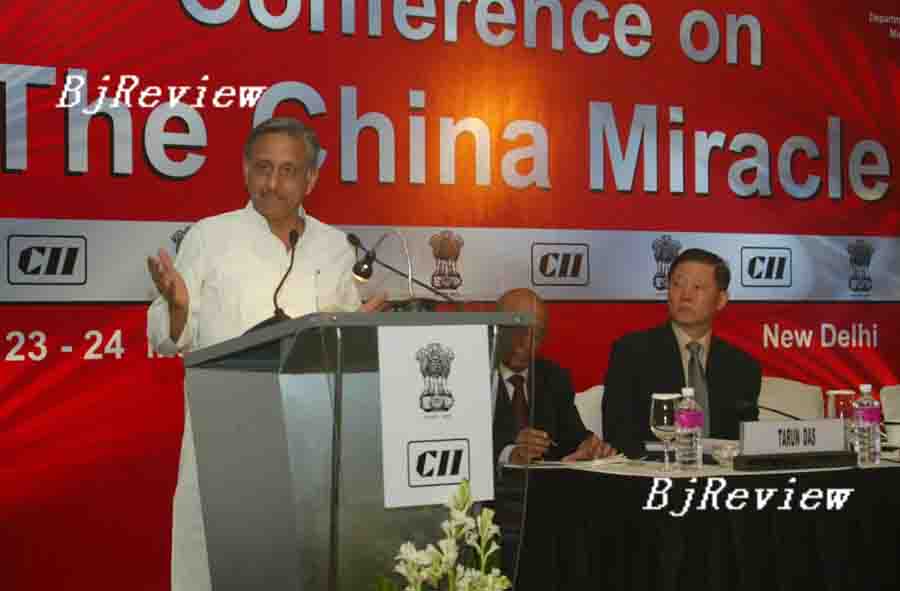 In recent years, the energy situation has increasingly become an unfavorable element in the development of China-India relations. The two countries have worked out and implemented their own energy strategies, such as expanding the development and utilization of foreign energy resources, to ensure their energy supply security, but that has to a certain extent caused competition between the two countries in this area.
The two Asian countries now face a similar energy predicament and both have sought to expand their overseas energy sources as an important way to ensure their own energy security, a result of rising energy demand and the increasing reliance on foreign energy resources.
For example, the investment in overseas energy development by the China National Petroleum Corp. (CNPC), one of the world's leading integrated energy companies, totals more than $40 billion. India's state-owned Oil and Natural Gas Corp. (ONGC) has spent $3.5 billion on overseas energy exploration and production.
Since most of the world's oil and gas resources are in hands of transnational companies based in the United States and Europe, China and India have to look for and develop energy resources in some high-risk locations or in countries having icy ties with the United States, and thus a rivalry exists between China and India, two big and neighboring developing countries.
They actually have crossed swords in some cases. In Asia, the rivalry was evident in the bid to acquire Petro Kazakhstan, that country's third-largest commercial oil producer, in August 2005. China won the competition at a cost of $4.18 billion.
An Indian oil company and CNPC also competed to acquire 38 percent of the shares of PT Medco Energi International, Indonesia's largest listed oil and gas company.
India got the upper hand in controlling oil and gas resources in Bangladesh, based on its geographic advantage.
In Africa, oil companies from the two countries tendered bid for the development rights to an oilfield in Angola. China prevailed in that case but the country paid $2 billion more than the asking price.
In South America, the rivalry for oil between China and India was evident in Ecuador in September of last year. India's OVL Co., an arm of ONGC, competed with a joint venture of Sinopec Group and CNPC, China's two largest oil companies, in bidding for Canadian company EnCana Corp's oil and pipeline assets in the South American country, and China won again.
From rivalry to cooperation
Because India set out much later than China to explore the international energy market, it is now relatively weak in the energy struggle with China, which has prevailed in most cases.
But India's participation in the international energy market often forced China to pay more for assets. That will damage the interests of both countries. After all, there will be a loser, and the winner will always pay a much higher price. The two countries must pay attention to bilateral coordination and communication and strengthen their cooperation in the energy field, so as to create their own energy security system.
Fortunately, leaders of both countries are aware of this need. Recently, both countries have expressed a strong will to cooperate and have put that into practice.
During his visit to India in April 2005, Chinese Premier Wen Jiabao said that energy cooperation is an indispensable part of the bilateral cooperation between the two countries. The joint declaration issued by the Indian prime minister and China's premier said that both sides agreed to cooperate in energy security and conservation, including encouraging relevant sectors to team up in exploring and developing oil and gas resources in third countries.
After the visit, the officials of the energy sectors and heads of energy companies of both countries frequently exchanged visits as a follow-up action to implement the joint declaration. The two sides also signed some memorandums of understanding on energy cooperation. The Indian side also hopes to set up a supervision mechanism for energy cooperation.
This teamwork has borne fruit. The two state-run oil companies, CNPC and ONGC, cooperated well in jointly developing oilfields in Sudan.
In February 2005, India's GAIL Ltd. signed an agreement with China Gas Holdings Ltd. under which the Indian gas company will invest $243 million to purchase 9 percent of the shares of China Gas.
In December last year, oil companies of the two countries successfully acquired 38 percent of the shares of an oilfield in Syria, which is worth $578 million. Each side holds a 50 percent stake.
In January and February this year, China, India and the European Union held a dialogue on energy cooperation and reached a series of agreements, including the memorandum of understanding on China-India energy cooperation, which has radically altered the harmful competition between China and India in acquiring overseas oil and gas resources.
| .jpg)
.jpg)